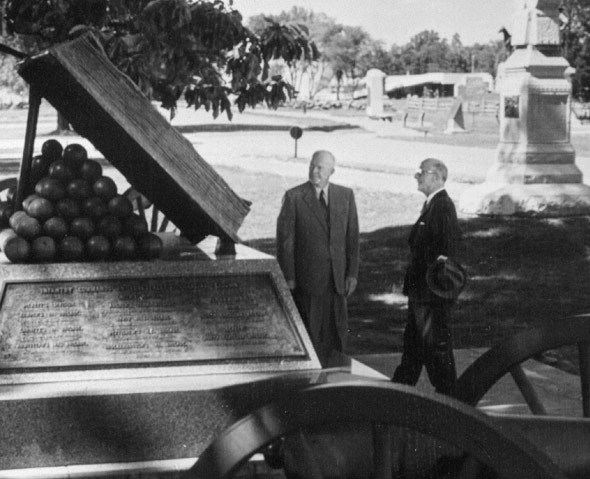
Dwight D. Eisenhower Library Fifty years ago during the centennial of the Civil War, an old soldier, one who had served as both a general and commander in chief, regularly toured the Gettysburg Battlefield. He first toured it as a West Point cadet forty eight years before. But now that he harbored his own experiences of war, the battlefield took on a different meaning and evoked a wider range of feelings. That old soldier, Dwight D. Eisenhower, devoted a lot of thought to the Civil War. It was a war that wove like a thread through his life, even though he was born 25 years after the Confederate surrender. Growing up in Abilene, Kansas in the 1890s, "Ike" sat and listened to the old men in town share their stories about "the war." He visited a Civil War battlefield for the first time when his West Point class came to Gettysburg to study the battle in 1915. He later returned in 1918 to assume command of Camp Colt, the US Tank Training Center, where his men trained for the Great War on another war's battlefield; eating, sleeping, and drilling on the same fields Pickett's men died. After a thirty year military career, Ike and his wife, Mamie, bought the first and only home they ever owned - a Gettysburg farm on which Confederate troops had camped before moving up to the front lines. A Confederate body was found buried in the backyard during reconstruction and landscaping of the farmhouse and grounds. The General liked to sit on his porch and muse how the two great armies confronted each other here at this very spot after traveling for hundreds of miles at a pace no greater than Caesar's legions traveled 19 centuries before. As President, Eisenhower delighted in inviting world leaders to the farm and giving them tours of the battlefield. Field Marshal Montgomery, Charles De Gaulle, and Winston Churchill (by helicopter) are among those that accompanied him. He enjoyed sharing his assessments of the battle and its commanders with friends, associates, and reporters. Eisenhower greatly admired Gen. Hancock for his leadership, Lt. Haskell for his initiative, and the aging Gen. Trimble for his tirelessness. He sympathized with the likes of Generals Meade and Ewell for whom history has not been overly kind. He was critical of Gen. J.E.B. Stuart who he considered to be more interested in garnering personal glory than winning the war. And he thoroughly detested Gen. Dan Sickles for not only disobeying orders at Gettysburg, but having the audacity to claim he was the hero of the battle and Gen. Meade a coward. Robert E. Lee was one of Eisenhower's heroes. Yet it was upon Lee's shoulders he placed the blame for the Confederate defeat at Gettysburg. He thought highly of Lee's character, though. When as Supreme Commander, Eisenhower wrote a short speech accepting the entire blame for the failure of the D-Day invasion, it was Lee's finest hour here at Gettysburg that he emulated. Fortunately, it was a speech he never had to deliver. Eisenhower reserved his greatest admiration for Lincoln. Lincoln's compassion, humility, patience, his sense of humor, and single minded determination to win the war made an indelible impression on Eisenhower. So it was with a great sense of honor that Eisenhower accepted the invitation to deliver the commemorative speech on the 100th anniversary of the Gettysburg Address. He gave the address in the National Cemetery, a cemetery little different from the one he would visit in France the following year to commemorate the 20th anniversary of D-Day and pay homage to all his men who died on the beaches of Normandy. We read Lincoln's sentiments, we ponder his words - the beauty of the sentiments he expressed enthralls us; the majesty of the words holds us spellbound - but we have not paid to his message its just tribute until we - ourselves - live it. For well he knew that to live for country is a duty, as demanding as is the readiness to die for it. Today, those who visit Gettysburg share many of Ike's feelings. He first visited as a student to study tactics and strategy and to examine the leadership qualities of the commanders. But when he later walked the fields as an old soldier, he more fully recognized the courage of the common soldiers, appreciated the brilliance and failures of their leaders, comprehended the sacrifices they together made, and sadly related to the horrors they experienced. |
Last updated: July 5, 2017
